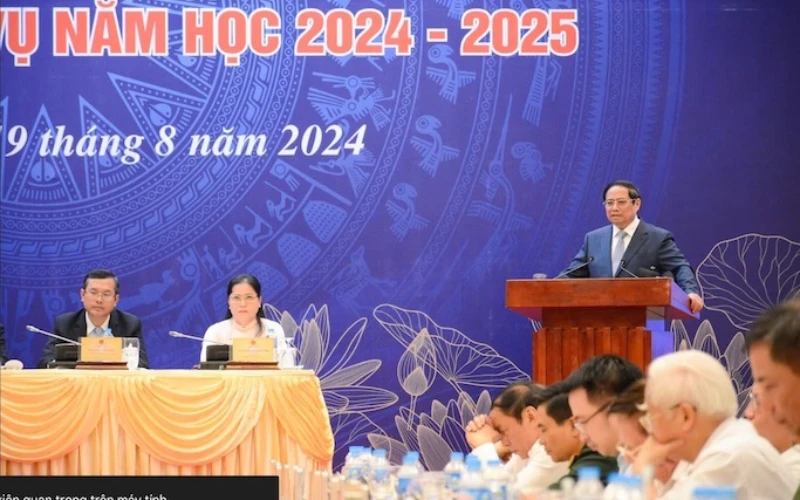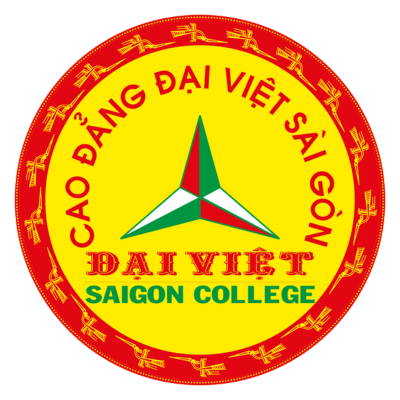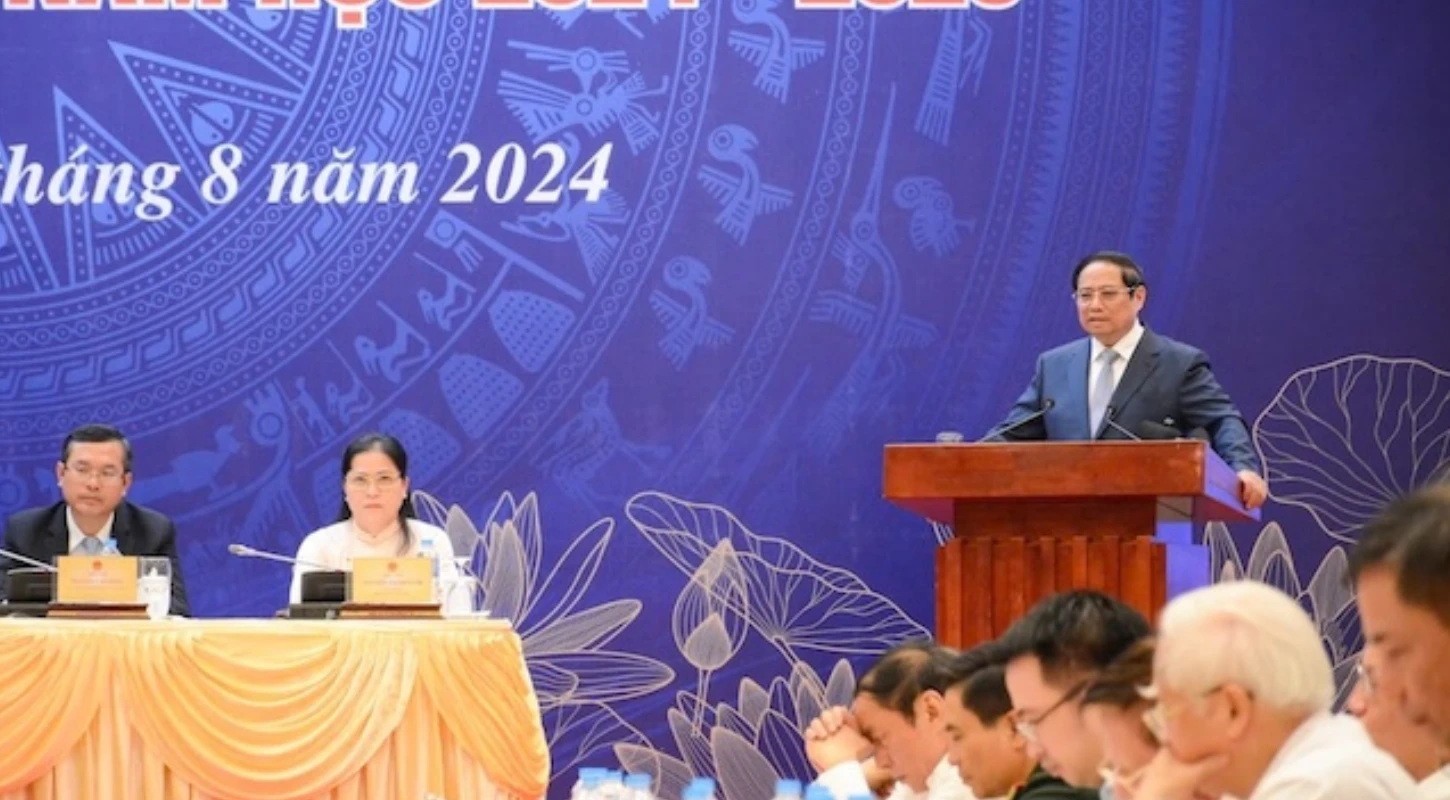The scale of education and the network of preschools, general education, and lifelong learning institutions have grown, ensuring that students' right to education is safeguarded. This expansion also helps meet the growing demand for education from the population and fulfills the need for human resource training for the country's development.
On the morning of August 19, 2024, Prime Minister Pham Minh Chinh attended the annual review conference of the 2023-2024 academic year and discussed the upcoming objectives for 2024-2025, organized by the Ministry of Education and Training (MOET). According to the Prime Minister, the education sector has made great efforts to overcome challenges throughout the 2023-2024 school year.
Strengthening Legal Frameworks and Policies
The education system has continued to focus on improving legal frameworks and policies to promote the development of education and training. Comprehensive legal regulations and guidelines addressing core and essential issues have been issued to meet the demands of educational reforms.
Expanding Education and Infrastructure
The scale of education and the network of preschools, general education, and lifelong learning institutions have grown, ensuring that students' right to education is safeguarded. This expansion also helps meet the growing demand for education from the population and fulfills the need for human resource training for the country's development.
Reforming General Education Programs and Textbooks
The reform of general education programs and textbooks has gradually stabilized and achieved initial success in line with set goals. These reforms include updating teaching methods at all educational levels, encouraging student creativity, and positioning teachers as facilitators and guides. New teaching methods are increasingly integrating advanced technology, and examination systems are shifting from purely knowledge-based testing to evaluating students' abilities and qualities.
Focus on Early Childhood, Primary, and Secondary Education
Efforts in preschool, primary, and secondary education, as well as literacy programs, have continued to receive attention from local authorities. This focus has created favorable conditions to ensure the highest enrollment rates, especially for disadvantaged children and those with disabilities. Additionally, education in ethnic minority areas, mountainous regions, and underprivileged areas has been prioritized for further development.
Excellence in Specialized Education
Vietnam’s specialized education has achieved remarkable results. National contests for excellent students, science and technology competitions, as well as international and regional Olympiads, have produced outstanding results. These accomplishments confirm the quality of general education and the nation’s successful efforts in identifying, selecting, and fostering gifted students, creating motivation and inspiration within society.
Enhancing Higher Education and Training for New Industries
Higher education has seen significant improvements, particularly in terms of quality. The Vietnam National Qualifications Framework continues to be effectively implemented, with a focus on training high-quality human resources for emerging sectors, such as semiconductor chip manufacturing and artificial intelligence (AI). Collaborative groups and alliances among top universities in engineering and technology have also been established, enhancing the nation's educational landscape.
Transparent and Fair National Examinations
The 2024 national high school graduation exam was conducted with seriousness, transparency, fairness, and safety, ensuring the highest standards. Meanwhile, university and college admissions processes have become more transparent and convenient for both institutions and students, helping to optimize societal resources and accurately assess student competencies.
Improving Teacher Quality and Educational Staff
The education sector continues to enhance the quantity and quality of teachers and educational staff by expanding the recruitment of qualified personnel. The quality of the teaching workforce has significantly improved, with a notable increase in the number of teachers meeting the required standards at all educational levels.

Prime Minister Pham Minh Chinh spoke at the Conference summarizing the 2023 - 2024 school year and implementing tasks for the 2024 - 2025 school year organized by the Ministry of Education and Training. Photo: Ministry of Education and Training
Embracing Digital Transformation
The sector has been proactive in advancing digital transformation and information technology application. Most educational institutions are now connected to high-speed internet, and digital platforms are increasingly used for school management. This transformation has revolutionized administrative processes and teaching methods. Furthermore, the deployment of digital applications based on educational data has accelerated.
Promoting Inclusivity in Education
At the conference, Prime Minister Pham Minh Chinh praised the education sector for its dedication to overcoming challenges, successfully implementing assigned tasks, and achieving notable results. The 10 key highlights of the education sector include the focused review of Resolution 29, resulting in the Political Bureau’s issuance of Conclusion 91 on August 12, 2024.
This conclusion introduced several important new points: Teachers' salaries are now prioritized as the highest in the administrative wage scale, with additional allowances based on job characteristics and geographic region. The State will ensure funding for compulsory and universal education and waive tuition fees for five-year-old kindergarten students. Priority will be given to investing in education for ethnic minorities, mountainous areas, border regions, and islands. Efforts will be made to gradually introduce English as a second language in schools, ensure adequate school facilities in major cities and industrial zones, and promote equal access to education.
Furthermore, breakthrough and comprehensive improvements in high-quality human resource training are planned, with a focus on science, technology, innovation, and new economic models such as the knowledge economy, digital economy, green economy, circular economy, artificial intelligence, and semiconductor technologies.



